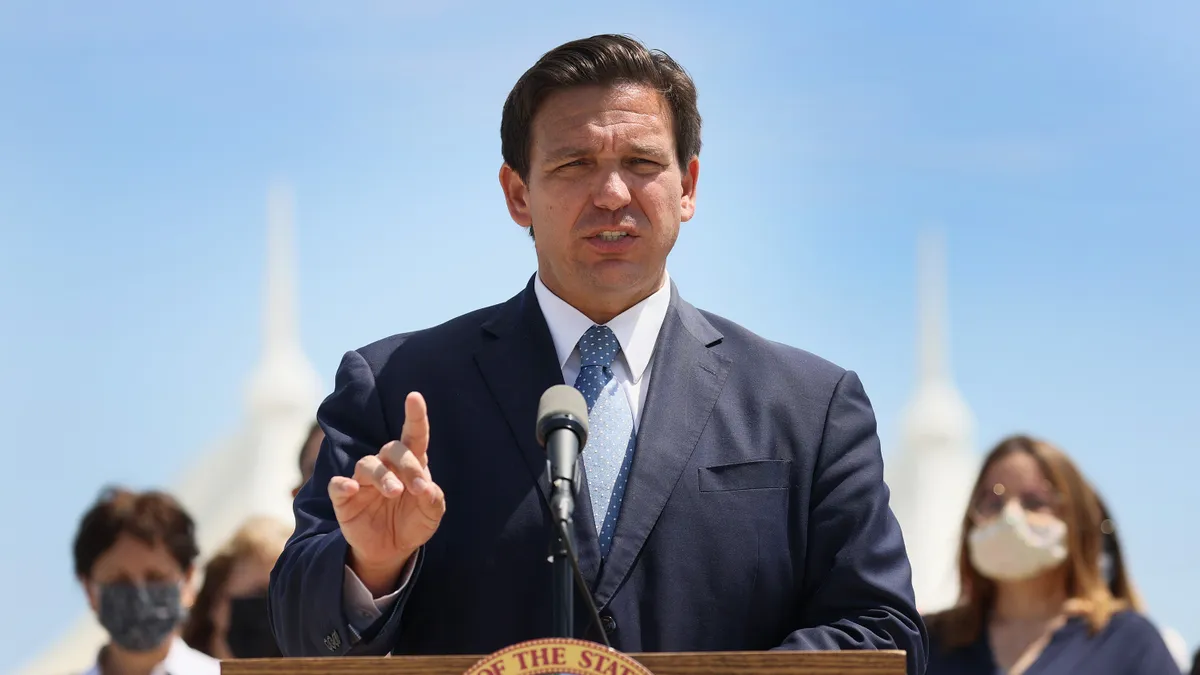Over the last several months, Florida’s Republican governor, Ron DeSantis, has amped up attacks on what he has deemed a dangerous status quo in public higher education, which he claims bludgeons students with “woke” liberal values.
DeSantis has mandated Florida’s public colleges and universities detail their spending on diversity, equity and inclusion, or DEI, programs. He executed what his critics call a conservative takeover of the public liberal arts institution New College of Florida, where he installed several far-right voices to the trustee board, as well as one of his most visible allies, former state Education Commissioner Richard Corcoran, as president.
He’s not done yet.
DeSantis’ broadsides against public postsecondary education culminated late last month with a promise to take legislative action to annihilate systems that perpetuate “identity politics and indoctrination.”
The proposed legislation DeSantis sought was introduced Tuesday. Sponsored by a House Republican who has taken up some of the governor’s other legislative priorities, the bill would upend some of the longest standing conventions of American higher education and introduce an unprecedented degree of state control, like forcing institutions to abandon gender studies programs.
Free expression advocates have characterized the proposal as censorious and draconian.
Andrew Gothard, president of United Faculty of Florida, the union representing broad contingents of Florida institutions' instructors, said it will fight the bill with all of its power. DeSantis hasn’t been able to produce a single example of higher ed brainwashing students, Gothard said. But with this bill, he is instead mandating a state-sponsored form of indoctrination, “fascism in its purest form,” he said.
Some of the bill’s provisions may also conflict with accreditor standards, like ensuring preservation of shared governance. Accreditors serve as gatekeepers for colleges to access federal Title IV money.
Below we summarize parts of the bill, which likely will see support in the GOP-dominated Florida Legislature.
Dictating instruction on certain topics
Elected officials orchestrating curricula clashes with core higher ed tenets. The predominant thinking among colleges is that faculty have responsibility for academics under the tradition of shared governance.
But the bill explicitly blocks colleges from offering majors or minors in intersectionality, gender studies, or critical race theory, a decades-old academic concept that originated with law scholars and in part teaches the systemic nature of racism.
The GOP began villainizing critical race theory toward the end of former President Donald Trump’s tenure, and the movement against it has only intensified. Many state Republicans introduced bills to banish the topic from K-12 schools and college classrooms, though often these policymakers conflate critical race theory with any DEI work.
Florida’s draft legislation also contains stipulations for general education courses, the classes students take as foundational work to compound studies in their chosen field.
It calls for colleges to reserve curricula “based on unproven, theoretical, or exploratory content” for elective or major-specific courses.
General education classes must not “suppress or distort significant historical events or include a curriculum that teaches identity politics.” Instead, the courses should, whenever applicable, “promote the philosophical underpinnings of Western civilization” and teach about key documents in U.S. history, like the U.S. Constitution, the bill states.
Giving more hiring authority to governing boards
Typically, high-ranking administrators and faculty decide which instructors to hire.
The bill would cede this authority to campus governing boards, which in Florida’s public university system are partially appointed by the governor, and in part chosen by the system-level board of governors. However, the Florida governor also selects most of the board of governors.
Boards could opt to return faculty hiring control to a university's president, who could not delegate the task to anyone else. And every year, presidents would need to share details of performance reviews for anyone with an annual salary of $100,000 or more with the board.
University governing boards’ would need to approve and then reconfirm every member of university executive teams and their salaries, also a job usually left to administrators.
Giving the power to OK high-ranking officials to governing boards is another form of a political litmus test, the faculty union said. Leaders fear boards would screen officials based on their beliefs.
Tenure restrictions
Debate over tenure has raged across the U.S., with opponents saying some professors have taken advantage of what is usually a lifetime appointment to perform poorly on the job.
Tenure is intended to shield faculty in their scholarship, however, in case they engage in potentially unpopular research.
The bill states Florida universities could, at any time, evaluate tenured professors after they have secured the status, a process known as a post-tenure review. A university would need “cause” to initiate such a review, which the legislation does not define.
Right now, the Florida university system is considering a policy that would set up post-tenure reviews, but those could only occur every five years.
Exiling diversity initiatives
Colleges would expressly not be able to fund programs that promote DEI or "Critical Race Theory rhetoric.”
Public universities in hiring could not also not rely on DEI statements, which generally describe job candidates’ commitments to diversity.
DEI critics present diversity practices as discriminatory or trying to lay guilt on students for past prejudices in American history, even though students didn't take part in those events. However, DEI work in part stemmed from colleges’ recognition that they have not always served disadvantaged populations well, like students who are racial minorities. DEI programs now intend to lift these students into the track of upward social mobility.























